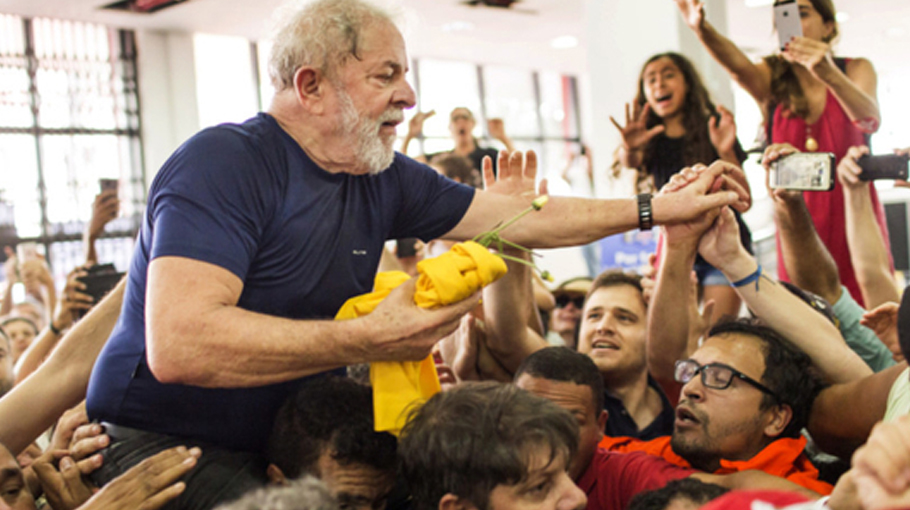The resurrection of Lula da Silva
Former Brazil president, jailed for years, now front-runner to replace Bonsonaro next year


In the normal course of politics, spending almost 600 days behind bars in a corruption scandal would seem like more than enough to end the career of any politician. Not in Brazil. And not when you’re Lula.
The left-wing demagogue and former President of Brazil, Luiz Inacio Lula da Silva, is ahead in opinion polls ahead of presidential election due next year — a remarkable resurrection for the 76-year-old ex-union leader, who is pledging to build a broad base of supporters alliances in a bid to unite a country deeply polarised by the presidency of Jair Bolsonaro.
Already this week elsewhere in South America, Chileans turned to leftist Gabriel Boric and elected him president to try and right the deep economic and social disparities that exist there. In Brazil, there is a deep economic malaise and divisions overseen by Bolsonaro.
Slow to act in bringing in coronavirus control measures after initially denying the seriousness and scale of the pandemic, the current president is unpopular with large swathes of economically disenfranchised voters. For them, the return of Lula to the political stage marks a sign of hope.
And Lula’s message that richer Brazillians need to pay more taxes is hitting home in a nation where growth is stagnant, unemployment growing and where its standing has been somewhat compromised by the president who was an ardent supporter of Donald Trump, taking lessons from his playbook. While bondholders have been jittery over the prospects of Lula’s return to power come Oct. 2, he is playing up the prospect of a full trade deal between the continent’s leaders with the European Union, and he plays to strengthen ties with Washington and Beijing. It’s a remarkable turnaround for a man who was behind bars two years ago and, up to March of this year, was banned from running for public office again.
Brazil’s Supreme Court has annulled his corruption conviction that saw him initially facing at least eight years behind bars. While he has yet to officially announce his candidacy in next October’s presidential campaign — voting is mandatory for all Brazilians aged between 18 and 70 — he is doing the rounds of media interviews and setting out his tent for the campaign. It’s a tent that many underprivileged Brazilians will eagerly enter.
Current opinion polls have the non-candidate Lula a little shy of the support of one-in-two voters. In contrast, just over one-in-five support Bolsonaro, whose appeal has plummeted as a result of his mishandling of the pandemic. Some 600,000 Brazilians have perished as a result of Covid-19 in a nation where the health structure was unable to keep pace with a rate of infection that multiplied under inaction that many blame on Bolsonaro’s populist rejection of the virus’ threat.
Lula last governed Brazil between 2003 and 2010 — a period of strong economic growth that was fuelled by a commodity boom in everything from oil, gas and minerals that helped many out of poverty. Unlike Bolsonaro, where the Amazon rainforest has been threatened through deforestation practises, Lula was an environmental conservationist who left office with 80 per cent support. Much of his current level of support is fuelled in part by sentimentality over the good times he oversaw.
He is actively pushing for the creation of a body similar to the European Union that would tie together the economics of South America, and he also wants to increase the nation’s inheritance tax that currently stands at 4 per cent up to levels closer to 50 per cent that are not uncommon across the EU. While an avowed socialist, his economic philosophy is simple — put more money into the hands of the poor and build a strong consumer base that naturally fuels economic growth. If there’s a stumbling block, it’s that many remember the legacy of his Worker’s Party after he left office. Dilma Rouseff, Lula’s successor, oversaw an economy that stalled and went into free fall — grist for the mill as Bolsonaro ran for office. But Rouseff’s term was also marked by large corruption scandals, embroiling Lula after he left office.
He is a former shoeshine boy and street vendor who was born in 1945 in Garanhuns, scratching out a living to supplement the family’s meagre income. His involvement in politics began soon after he landed a job at a metalworks in 1964, leaving in 1972 to work full time as union representative. His profile rose nationally for organised wage increases in opposition to a succession of military governments, finally ending up in prison for national security violations.
He is a founding member of the Worker’s Party and first ran for public office in 1982, finishing fourth in the race to be Sao Paulo governor.
He was first elected to the national Chamber of Deputies in 1986, failing in a bid to become president three years later. He ran unsuccessfully for the presidency on three occasions, each time increasing his vote, raising his profile and toning down and broadening the appeal of his socialist ideology.
In 2002 he promised to work with business leaders and the International Monetary Fund to grow the nation’s economy. It was a message that hit home with a majority of voters, defeating the government-backed candidate Jose Serra with 61.5 per cent of the vote.
He was re-elected four years later and was constitutionally barred from running for a third term. What’s clear now though is that although he has yet to formally declare, Lula has his sights firmly set on regaining the presidential office once more. And almost half of Brazil’s voters support him now. Yes, the race is unofficially on.
Mick O' Reilly is Foreign Correspondent at Gulf News. Source: Gulf News


